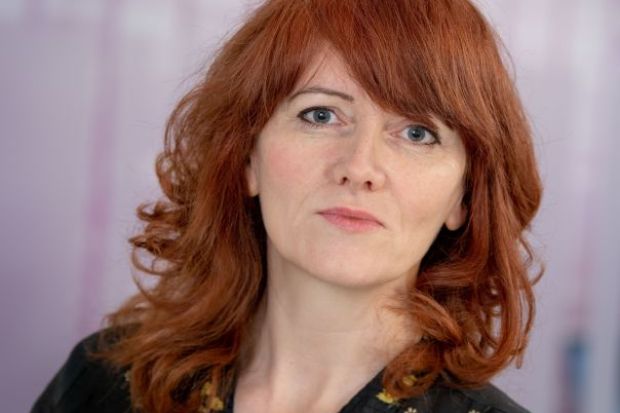Annebella Pollen is director of the Centre for Design History at the University of Brighton, where she is reader in the history of art and design. Her research areas include mass photography and the popular image. She recently won the Philip Leverhulme Prize, awarded to UK academics whose work has had international impact and whose future research career holds exceptional promise. She plans to use the £100,000 prize money to embark on a groundbreaking project on photography by children since 1900.
Where and when were you born?
Plymouth, 1973. I was the youngest of five children. My parents were strict Catholics. My dad tried to get elected as a right-wing MP when I was very small, then he owned a gun shop when I was at primary school. Later, he went into selling traditional Catholic merchandise and literature, first through a high street shop, then mail order from our home. My mother was a housewife who cooked a full meal for seven people at 6pm every night and sewed most of our clothes from scratch.
How has this shaped you?
Well, I’m a lefty pacifist atheist, so I shaped myself in conscious opposition to most aspects of my upbringing. But I grew up surrounded by books and crafts, and aspects of religious iconography still appeal to me aesthetically: I collect Catholic kitsch.
How did you get into studying material and visual culture?
I’d left home at 16 but kept my A levels going (just) from my bedsit. I then had 10 years out of formal study, working in clothes shops and modelling for artists, but I also read voraciously, wrote daily, exhibited paintings, sang in bands, made shoes and performed poetry. I was enthusiastic about many creative practices but had no focus. Visual culture, when I eventually stumbled across it, seemed to cover everything I was interested in.
What advice would you give to your younger self?
There are careers in all the things that most interest you: reading, writing, collecting.
What divided your life into a ‘before’ and ‘after’?
In my mid-twenties, my mother died suddenly. I discovered I was unexpectedly pregnant in the same week as her funeral. Adulthood hit me hard over the head. Those two incidents jointly marked a new life phase for me.
What kind of undergraduate were you?
Pretty unusual. I started my BA when I was 28 as a single parent on benefits. I was able to study with a two-year-old because the university, its nursery, the library and my flat were all in a 10-minute radius. I was immediately smitten by study, although I was quite isolated by my circumstances. I was closer in age to the academics. A few weeks after I began, I decided that I wanted to be a lecturer, too.
What’s your most memorable moment at university?
Probably my PhD graduation. The University of the Arts London has a shocking pink and purple velvet polyester hat and gown that is monstrously camp, but I wore it with huge pride in our ceremony at the Royal Festival Hall. The artist Grayson Perry gave a speech. He’s the only one who looks good in the UAL robes.
What drew you to mass photography?
Eighteen years ago, I met my partner, a bric-a-brac dealer, while I was experimenting with selling knick-knacks in an antiques market. I was fascinated by the fact that he made money selling old photos of strangers. I felt sad that the people in the photographs had become detached from their families and forgotten. This sentimental impulse began a long ongoing journey into popular photography as a form and a practice. Despite its enormity – it has been a major democratic system of mass visual communication since the late 1880s – it is often dismissed as aesthetically banal. It is so individually meaningful, however, and socially significant.
How did it feel to win the Philip Leverhulme Prize?
I screamed! It’s a massive honour for me and a huge boost for my institution and my subject area.
Tell us about the project you will use the money for.
I’m going to develop a project – a book and exhibition – about the history of photography by children. Over the years, I’ve discovered some extraordinary archives, and they offer historical answers to contemporary questions, for example, about the benefits and challenges of children’s use of camera phones and social media. I’m using photography as the lens through which to view changing conceptions of the child since 1900.
What’s the most common misconception about your area of expertise?
People think I’m knowledgeable about the technicalities of cameras. I have no interest at all. I also have no photographic skills.
How do you combine your research and teaching?
I’ve been lucky enough to have designed modules based on my interests over the years, from the cultural politics of dress to vintage and retro design. This helps me bring live research to the classroom. As cultural commentators, students always teach me so much. Most of my teaching is now PhD supervision, often in collaboration with museums; here, students are co-researchers.
What are the best and worst things about your job?
The best: being paid to read books and discuss ideas with brilliant minds. The worst: the admin that comes before and after.
What do you do for fun?
Rummaging at car boot sales, dancing at goth discos, travelling the former Eastern bloc.
What one thing would improve your working week?
I struggle to find anything I want to change fundamentally. That must mean I am living the dream!
anna.mckie@timeshighereducation.com
Appointments
Andrew Parfitt has been promoted to vice-chancellor of the University of Technology Sydney. He has held the post on an acting basis since October, when Attila Brungs left to become vice-chancellor of UNSW Sydney; before that he served as provost and senior vice-president. He has also held senior roles at the universities of Newcastle and South Australia. “Andrew has the experience, skills and comprehensive understanding of UTS required to deliver our vision to be a leading public university of technology recognised for our global impact,” said chancellor Catherine Livingstone.
Craig Mahoney will be the next vice-chancellor of the University of Law. After eight years as principal of the University of the West of Scotland, he will join the private institution in early 2022, succeeding Andrea Nollent, who has become chief academic officer of parent company Global University Systems. Professor Mahoney, a performance psychologist, was previously chief executive of the Higher Education Academy. Lord Blunkett, chair of the University of Law board, said Professor Mahoney would help the institution “expand its reach internationally while consolidating its high-quality, high-reputation delivery to students studying in the UK campuses”.
Jim Irving has been appointed university secretary and registrar at Solent University, Southampton. He is currently academic registrar at York St John University.
Gillian Docherty will be the new chief commercial officer at the University of Strathclyde. She is currently chief executive of the Data Lab, Scotland’s innovation centre for data and artificial intelligence.
Lorraine Thomas is joining the Royal Agricultural University as its first pro vice-chancellor (education and students). She was previously academic director (quality and employability) at Anglia Ruskin University’s London campus.
The Association of Commonwealth Universities has appointed Barbara Kasumu director of membership, programmes and development, and Beth Button director of strategic communications.
Register to continue
Why register?
- Registration is free and only takes a moment
- Once registered, you can read 3 articles a month
- Sign up for our newsletter
Subscribe
Or subscribe for unlimited access to:
- Unlimited access to news, views, insights & reviews
- Digital editions
- Digital access to THE’s university and college rankings analysis
Already registered or a current subscriber? Login








